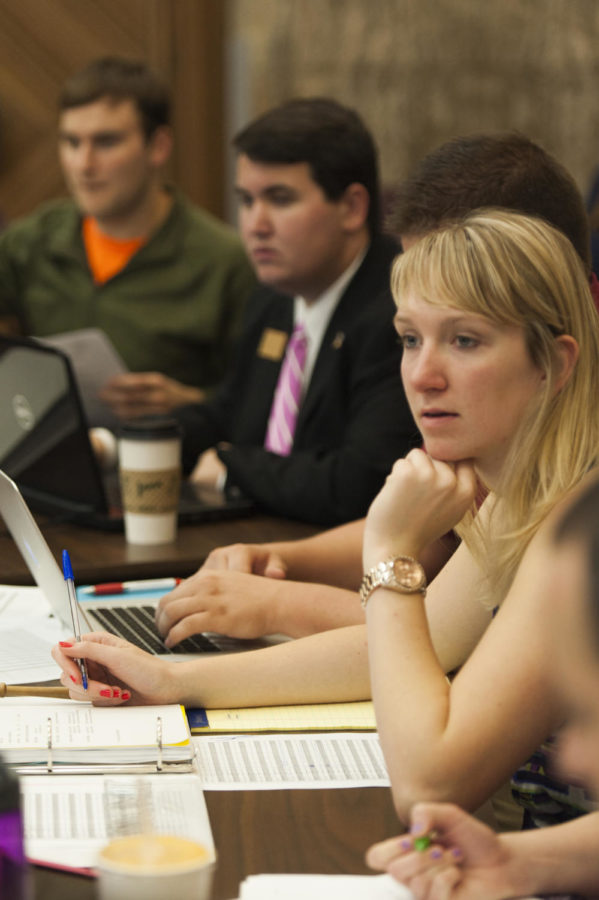Khayree Fitten withdraws petition on campaign spending limits
Hillary Kletscher, junior in biological systems engineering, listens senators discussion about campus town reconstruction project. GSB held weekly regular meeting at Campanile Room of the Memorial Union at 7 p.m. on Wednesday, Oct. 9.
October 21, 2013
After submitting a petition arguing that the campaign spending limits established by the Government of the Student Body Election Code are unconstitutional, Khayree Fitten later withdrew the petition.
According to the petition, GSB spending limits are unconstitutional due to a 2010 ruling by the U.S. Supreme Court in Citizens United v. FEC, 558 U.S, as well as Iowa Code Chapter 68A. The Citizens United ruling held campaign funds as a form of political speech, while Iowa Code chapter 68A states Iowa is not a state which imposes contribution limits.
Election Commissioner Adam Guenther expressed his disappointment with how the situation was being handled at the GSB Senate meeting on Oct. 9.
“No one has ever approached me about it. I don’t know anything about this. No one’s talked to me about it. I just feel like this is coming out of the blue. I feel like anyone on senate would have approached me about this, talked to me so we could have got this done through the election commission. We could have voted on it as a Senate,” Guenther said.
GSB Supreme Court Chief Justice Caytlin Hentzel said the court was not given the information it needed to make a decision.
“How we interpreted his petition that he submitted was we weren’t sure, OK, so are you wanting us to just get rid of your hundred-dollar limit or are you wanting us to get rid of the spending in general?” Hentzel said. “He did not submit additional information for us to get an answer to that question.
Hentzel said Fitten was asked to submit a brief with guidelines laid out from the court. The day his brief was due he withdrew his petition. He did not give a reason for withdrawing his petition.
Guenther, Election Commissioner since April 2012, said some form of spending limits on both candidates for senate and for executive positions have existed since at least the 2009 election.
Fitten ran unopposed for the senate spot from the Inter-Fraternity Council last year. He received 122 votes.
Guenther said any candidate running has to submit a financial disclosure form saying how much money they took in, where it came from, what it was spent on and also include receipts. He said Fitten did not submit a financial disclosure form, but later said he was unsure if Fitten did or did not.
Guenther also said only a handful of people submitted disclosure forms.
“I believe only a handful of people turned in senate expenditures … a lot of people didn’t do it. So I think only maybe three people at most did it,” Guenther said.
Guenther stated that, to the best of his knowledge, there has never been a candidate to exceed the spending limit.
Hentzel said Fitten is welcome to resubmit his petition if he would like.
“He is free to file that again if he feels that his issue was not handled, possibly within GSB,” Hentzel said.
Fitten, sophomore in political science, declined to comment on the situation.










